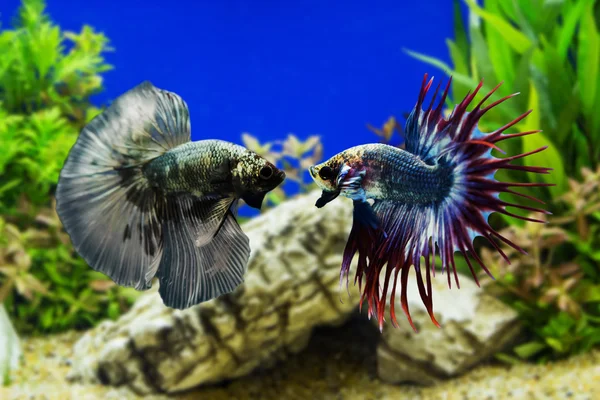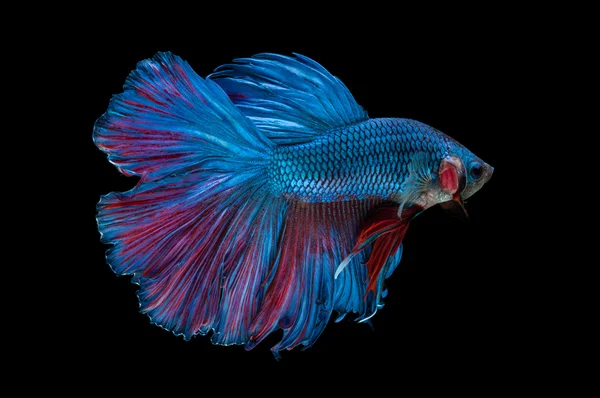Can betta fish live in cold water?
While most betta fish are tropical fish, there are a few that can live in cold water. If you’re looking for an easy-to-care-for fish, then a betta fish might be the perfect pet for you! With the fact that they are easy to care for, you may be wondering whether or not they should be in a tank without a heater.
Here we’ll discuss how to care for a betta fish in cold water, as well as some of the best tips for keeping your fish happy and healthy. So if you’re interested in learning more about keeping a betta fish in cold water, keep reading!
Are Betta Cold Water Fish?

One of the most popular fish kept as pets is the betta or Siamese fighting fish. Bettas are known for their beautiful fins and vibrant colors, and they are relatively easy to care for. One of the most common questions about bettas is whether or not they are cold-water fish.
While bettas are native to Thailand, which has a tropical climate, they can actually tolerate a wide range of water temperatures. In the wild, bettas live in slow-moving streams and ponds, where the water temperature can vary depending on the time of day and season.
As a result, bettas have evolved to be able to adapt to changing conditions. In the home aquarium, bettas can be kept in either cool or warm water, although they will generally do better in warmer temperatures.
While they can survive in cold waters for a time, bettas are not cold water fish and shouldn’t be treated as such.
How Long Can Betta Fish Live In Cold Water?
Betta fish are a tropical species that is commonly kept as a pet. In the wild, they live in warm, freshwater habitats in Southeast Asia. However, bettas can also tolerate cooler water temperatures than most other tropical fish.
This is due to a special ability known as surface cooling, which allows them to absorb oxygen from the air directly into their bloodstream. As a result, betta fish survive for short periods of time in cold water, though they will become sluggish and may stop eating if you have very cold water.
For this reason, it is important to acclimate bettas slowly to colder water temperatures if you plan on keeping them in a cooler aquarium. With proper care, bettas can live for 2-3 years in captivity.
If they are in cold water, then their lifespan may be much shorter, and they may struggle to live for more than six months. When kept in perfect conditions, bettas can survive for up to 5 years, but the average lifespan is around 3 years.
You also need to be mindful of temperature shock. When there is a huge change in temperature, fish can die very quickly. While you need to keep the tank in the ideal water temperature range, you also want to give your betta fish a constant temperature.
What’s The Ideal Water Temperature For Betta Fish?
Most people think that betta fish are tropical fish that require warm water. However, bettas are actually quite tolerant of a wide range of temperatures. In the wild, they can be found in both cool and warm streams, and they will do fine in water that is anywhere from 72 to 86 degrees Fahrenheit.
That said, there are some benefits to keeping bettas in water on the warmer end of this spectrum. Warm water tends to be more oxygenated than cooler water, which can be beneficial for bettas since they breathe primarily through their gills. They struggle to get enough oxygen if they don’t get suitable water temperatures.
In addition, warmer water speeds up the metabolism of bettas, which can lead to faster growth rates. For these reasons, many betta breeders recommend maintaining a water temperature of around 80 degrees Fahrenheit. As long as the water is not too cold or too hot, your betta should be just fine, but the ideal temperature range is between 76 and 80.
Dangers to Your Betta In Cold Water

There are some big reasons why you shouldn’t keep bettas in cold water; we take a look at them here:
It Makes Them More Prone To Diseases
Most bettas are largely sedentary, meaning they don’t move around much. This lack of movement means their immune system isn’t as active as it could be, making them more susceptible to diseases as well as bacterial and fungal infections such as fin rot.
Betta fish are tropical fish, which means they prefer warm water. When the water is too cold, their immune system doesn’t work as well, and they’re more likely to get sick.
Their Metabolism Will Slow
Metabolic rates depend on water temperature. When water gets colder, betta fish have to work harder to maintain their body temperature. As a result, they burn more energy, and their metabolism slows down.
In addition, cold water is less dense than warm water, so betta fish have to swim faster to move around. This also requires more energy and can lead to a drop in metabolism. In the wild, Betta fish live in tropical climates where the water is warm.
As a result, their bodies are not well adapted to cold temperatures, and their metabolism suffers as a result. If you keep betta fish as pets, it is important to provide them with a warm environment where their metabolism will not be impacted by the cold.
They Will Slow Down
These vibrant and beautiful fish are popular pets due to their docile nature and ability to thrive in a wide range of living conditions. However, one quirk of bettas is their reduced activity levels in cold water.
While bettas can tolerate temperatures as low as 60 degrees Fahrenheit, they become much less active when the water temperature drops. There are a few possible explanations for this behavior.
First, bettas are cold-blooded animals, meaning their body temperature is determined by the surrounding environment. As the water temperature drops, so do the betta’s body temperature, causing it to slow down and become less active.
Additionally, bettas rely on special cells called sensory pits to help them locate prey. These pits are less effective in cold water, making it more difficult for bettas to find food.
As a result, they often reduce their activity levels in order to conserve energy. Whatever the reason for their reduced activity levels, bettas are still fascinating creatures that make enjoyable pets.
Signs That Aquarium Water Is Too Cold For Your Betta
The bottom line is that if you don’t have a heater, your betta fish tank won’t be the ideal temperature. In the wild, they often inhabit much cooler water than their aquariums, but this is not ideal, and they will always seek warmer waters.
There are certain signs that indicate when water is too cold for your betta. One of the most obvious signs is lethargy. If your betta is normally active and playful but suddenly becomes sluggish and inactive, it may be a sign that the water temperature is too low.
Other common signs include loss of appetite and increased breathing rate. If you notice any of these signs, it’s important to take action to raise the water temperature. Otherwise, your betta may become sick or even die.
Should You Use A Heater In Your Betta Tank?
Bettas are tropical fish and prefer warm water; therefore, you should use a heater for a range of different reasons. First, if you live in an area with large temperature fluctuations, a heater can help to maintain a consistent temperature to keep betta fish warm.
Second, if you keep multiple bettas in the same tank, a heater can help to prevent fighting by creating distinct “warm” and “cool” areas of the tank. Finally, some bettas prefer water that is slightly warmer than others, so a heater can be used to create a comfortable environment for your fish.
Ultimately, whether or not to use a heater in your betta tank is a personal decision. However, if you do choose to use one, be sure to select an aquarium-safe model and closely monitor the water temperature to ensure that your fish stays happy and healthy.
Unless you have a huge tank, aquarium heaters aren’t expensive, and nor do they use a lot of energy. 80 degrees Fahrenheit is warm for fish, but if you dived in a pool with 80-degree water, you’d think it was very cold. You just need a heater to raise the water temperature slightly to a comfortable level for your betta.
Ways to Keep Your Betta Warm Without Using A Heater
If you won’t have a heater, there are ways that you can keep the tank as warm as possible. Let’s check them out.
Have a Warm Room
First, make sure the room is warm and well-insulated. This will help to prevent heat from escaping. Second, consider using a desk lamp or other form of lighting to create a warmish atmosphere. Finally, don’t forget to give your betta plenty of plants.
Not only do plants help to create a naturalistic environment, but they also provide shelter and hiding places where bettas can retreat when they feel cold. By taking these steps, you can help ensure that your betta stays warm and happy even if the temperatures drop outside.
Use a Small Fish Tank
One way to keep your betta’s tank warm is to choose a small fish tank or fish bowl. A smaller tank will retain heat better than a larger one, making it easier to maintain a consistent water temperature and avoid freezing temperatures. You can also try using a glass bowl instead of a plastic tank.
Glass is a better conductor of heat, so it will help to keep the water warm. Finally, you can place your fish tank in a sunny spot. The sun’s rays will help raise the water temperature, making it more comfortable for your betta.
Use Strong Lights
One way to do this is to arrange stronger lights over their tank. This will help to raise the water temperature a few degrees. You can also place their tank in a warmer part of the house, such as near a radiator or in a sunny spot.
Use a Filtration System
Many people opt to use a heater in order to keep their betta fish warm, but there are other ways to achieve this without using one. One way is to install a filtration system. This will help to regulate the water temperature and keep it at a consistent level.
Cover the Betta Tank
One way is to simply cover the tank. This will help trap in heat and create a warm environment for your fish. It will help prevent any heat from escaping and keep the tank at a stable temperature which will be healthier for your betta.
How To Keep Betta Healthy
Any betta owner knows that a healthy fish is a happy fish. Whether you have freshwater and saltwater fish, you need to know what they need. You can do a few simple things to ensure your betta has a healthy life.
Tank Setup – First, it’s important to have the proper tank setup. Your betta will need at least 2.5 gallons of water, and the tank should be equipped with a filter and heater. Betta don’t need huge tanks, which is ideal if you want to keep the water as warm as possible.
Food – You’ll need to feed your betta a high-quality diet of pellets or flakes. It’s also a great idea to treat them to freeze-dried foods and live foods to give them a balanced diet.
Water Tests – It’s important to test the water regularly. Test strips are quite cheap, and they’ll allow you to check the nitrate/nitrite, PH level, chlorine, and water hardness. This allows you to keep on top of your water quality.
Water Changes – Always perform regular water changes. There is only a certain amount of waste that your filter can clear up, and it won’t be able to get any waste that falls to the bottom of the tank.
Chemicals – Use chemicals for tap water to neutralize any chlorine and make it safe for your fish. Be sure to use chemicals carefully, as they can be harmful to your betta. Always follow the instruction on the label.
Final Thoughts
The colder the water, the slower a betta fish’s metabolism will be. This means they won’t eat as much and will be more prone to disease. They are not cold water fish and require warmer waters.
Betta fish cannot live in freezing water and should not be kept in an unheated aquarium for a prolonged period of time. Aquariums with filters and heaters are best for keeping betta fish healthy year-round, but if you must use cold water, try and keep the tank as warm as possible using the advice above.

